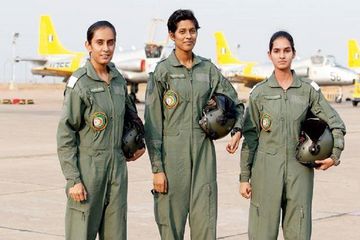Women Pilots Do More Than Just Flying A Plane, They Give Wings To Aspirations
At a family wedding recently, I happened to have a long chat with my 11-year-old niece, checking with her about her curriculum, languages she’s learning, her hobbies, etc. Then I asked her the most common question any Indian elder generally asks a child of this age:"Bade hoke kya banoge?" (What do you want to be when you grow up?). She replied, instantly, “I want to be a pilot.” I took her response very lightly--literally laughed at it--thinking it was a far-fetched dream that will die on its own as she grows older. But then suddenly, I felt a pang of guilt. How could I laugh at someone’s dream like that? Did I ignore her response because of the career choice, or because it came from a girl? Would I react the same way if her she said she wanted to be a doctor or a lawyer?
The following day, I spent some time on the internet reading about great pilots--especially women pilots--and I was not surprised by the statistics globally. If the numbers are to be believed, of all the studies that I came across, the maximum percentage of female pilots working with any airline was less than seven percent. These statistics mean you will have to travel on about 20 flights before you hear a woman's voice introducing herself as the captain. My own travel experience supports this. Take our own country for instance. The Indian Air Force was established in the year 1932, and it is now in 2016 that it has commissioned the first batch of women fighter pilots.
Although I was not surprised by the numbers, they compelled me to read more and find out the reasons behind this imbalance. The most common reason, I figured out, was that girls simply don’t consider flying as a career option. They just don’t have enough women pilots as role models. Counseling teams at schools do not promote it the way they would promote medicine or architecture.
A few girls may be interested to take up pilot training, but don’t do so as they see it as difficult or dangerous. That’s where a healthy communication with role models, or counselors, can play a significant role, so as to help these aspirants shrug off needless fears.
Another interesting fact that I observed was that most of the famous or successful women pilots had developed their interest in flying between the ages of five and ten. More importantly, this realisation was triggered by some kind of direct visual experience; for instance, visiting the cockpit during a flight, a trip to the air force museum, staying close to an airport/airfield and watching flights take-off frequently. One major reason for some of the women pilots to take up this career has been the influence of family--having thier father/uncles/cousins in the same profession.
Two of these three women pilots in the Indian Air Force have family members serving either in the Indian Army or the Air Force. The parents’ role is crucial here; a lot depends on what they expose their young daughters to. Unfortunately, sometimes parents--and some other times, marketers--don’t let girls go beyond Barbie. Try gifting a fighter plane instead of a doll for your daughter’s next birthday. You never know, it might just change her life!
Agreed, it requires years of training, mastering technical concepts and skills. However, none of this qualifies as an excuse for keeping girls away from such a wonderful experience. Once trained, it really does not make a difference if the person on the pilot’s seat is male or female. As Helen McNamara, a senior first officer flying the Boeing 767 for British Airways, says, “On my training course, there were people who came from law, there were people who came from architecture, so it's not just a pure science background required.”
Flying was once a male-dominated field. In fact, the first female commercial pilot, Yvonne Pope Sintes, says, “When I first started, one of the pilots said he would resign if a woman joined.” She perhaps got more surprised looks from passengers than colleagues, but that was in the 1960s. Few women pilots today would complain of gender bias or negative response from passengers. It’s high time we stop making excuses to keep our brilliant daughters away from an amazing career experience, and start motivating them to achieve the best.
















